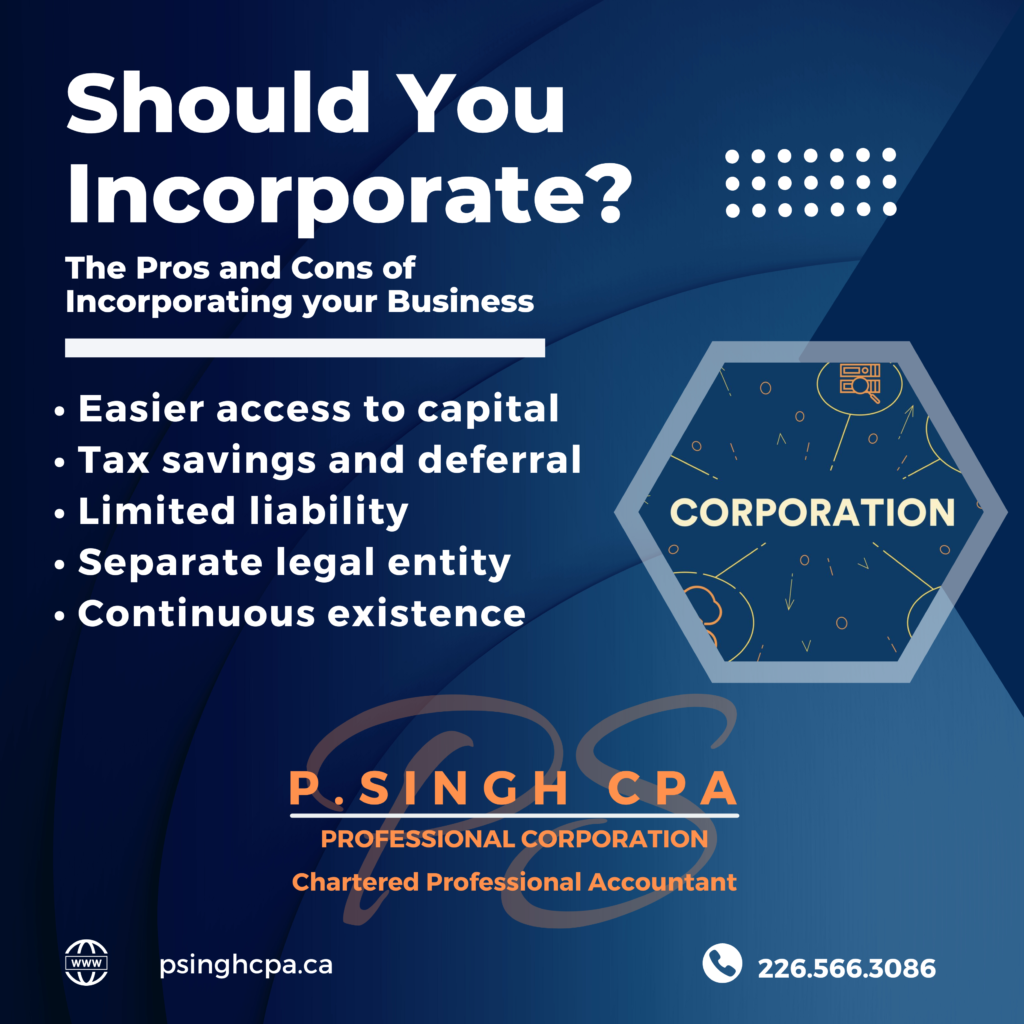To incorporate or not? That is the question many self-employed workers and entrepreneurs starting a new business ask themselves.
The short answer is that it depends on many factors, including:
- How much revenue the business earns
- What your goals are for your business
- What your personal tax situation looks like
- What type of business it is
- What the potential legal liability is within the business
Those still hesitant about incorporating their businesses should know that incorporating comes with many advantages. If you want to grow and hire people, a corporation is by far the preferable structure.
Incorporating offers several advantages over sole proprietorships.
- Owners benefit from limited liability: Shareholders are not responsible for a corporation’s debts. If your corporation goes bankrupt, your shareholders only lose up to what they invested. If you are operating your business through a corporation, liability is limited to assets held within the company. Your personal assets would not normally be at risk should the business fail to pay its debts.For example, if an electrician installs faulty wiring that causes a fire, his customer could sue for damages. If the electrician is operating his business as a sole proprietor, the plaintiff could go after the personal assets of the electrician to pay for damages. However, if the business operates as a corporation, only the assets within the corporation would be at risk.
- Lower tax rates and tax deferral opportunities Corporations are taxed separately from their owners. Corporate tax rates are generally lower than personal income tax rates.
For example, Jennifer operates a machine rental business that earns $180,000 per year. However, Jennifer only needs $80,000 annually to support her lifestyle.If Jennifer operated the business as a proprietorship, she would pay personal tax on the full $180,000 in the current year. She would owe approximately $60,000 in tax.However, if she operated her business through a corporation, she could choose to only take out $90,000 from her corporation in the current year. She would then only owe tax of around $40,000 in total during the year ($18,000 corporate tax, $22,000 personal). The $20,000 in saved taxes could be left in the company and used to grow the business. This concept can be a little bit misleading. Jennifer hasn’t really avoided paying $20,000 in tax; she has just deferred that tax. When she eventually decides to withdraw that money from the corporation, she will have to pay personal tax on the income. If Jennifer instead decided to use the money within the corporation to buy income-producing assets (power tools to rent out or a vehicle to deliver things, for example), then she would not ever have to pay personal tax on those funds. The real benefits come from the ability to use deferred tax dollars to grow your business. You also gain the ability to plan out personal income to take advantage of lower marginal tax rates.
- The life of the corporation can extend beyond that of the founders: Corporations live on until they wind up, amalgamate, or give up their charter (for example, when they go bankrupt). With other business structures, a business stops existing when the owner dies. A corporation is a separate entity to you, so it continues to live on regardless of what happens to you. This can be helpful when planning to transfer your assets to others.
- Easier Access to capital and increased credibility : Corporations have the same rights as a real person, including owning property, getting loans, and entering into contracts. Corporations can borrow money at lower rates. They can also raise money by selling shares or bonds to investors (called shareholders).
- Lifetime Capital Gains Exemption (LCGE) — The LCGE allows some incorporated businesses to sell at a gain of up to $913,630 without paying any tax, on sale of Qualified small business corporation (QSBC) shares of the business.
- Income Splitting — Income splitting used to be a major reason for incorporating your small business. Since 2018, this has changed significantly due to some new tax regulations. It can still work, but is now much less of an advantage than is used to be.
When deciding whether or not to incorporate, you need to weigh the advantages against the potential disadvantages, which we’ll discuss next.
Here is a brief overview of the disadvantages of incorporation
- Incorporation Costs — There are costs involved when starting a company. Having a lawyer help draft the documents of incorporation is a good idea, but it isn’t cheap.
- Ongoing Costs — There are annual legal filing fees to be paid as well as fees to have an accountant file the annual corporate tax return.
- Administrative Burden — The corporation requires legal and tax filings each year to remain in good stead with the authorities. This requires attention and is a time commitment for the owner(s).
- Losses More Difficult to Use — If your business sustains financial losses, it is more difficult in a corporation than in a proprietorship to use those losses to reduce future taxes.
- Pay More Taxes — In some scenarios operating your business through a corporation could actually mean you pay more taxes than if operating as a proprietorship.
In a nutshell, incorporating your own business would be useful if you are looking to grow your business, make full use of tax deferral opportunities while making sure you protect your hard earned personal assets.
We at PSingh CPA Professional Corporation can help you understand if incorporation is a good solution for your situation and incorporate your new business for you. We provide full course bookkeeping, accounting and tax advisory services to small businesses. Contact us today to book an appointment and we’d be happy to help.
Sources:
https://www.avalonaccounting.ca/blog/should-i-incorporate-my-business
https://ised-isde.canada.ca/site/corporations-canada/en/benefits-incorporating
https://www.edwardjones.ca/ca-en/market-news-insights/guidance-perspective/business-incorporation?utm_source=google&utm_medium=cpc&utm_campaign=dsa-17095410446-134019204417-dsa-1536418750204&gclid=Cj0KCQjwj_ajBhCqARIsAA37s0wuEH7RwTsy9nO4GOp5YUtrFZR-pBh5w7uaVm0ABaZBZ1J0nUnnpV8aAsZ3EALw_wcB



